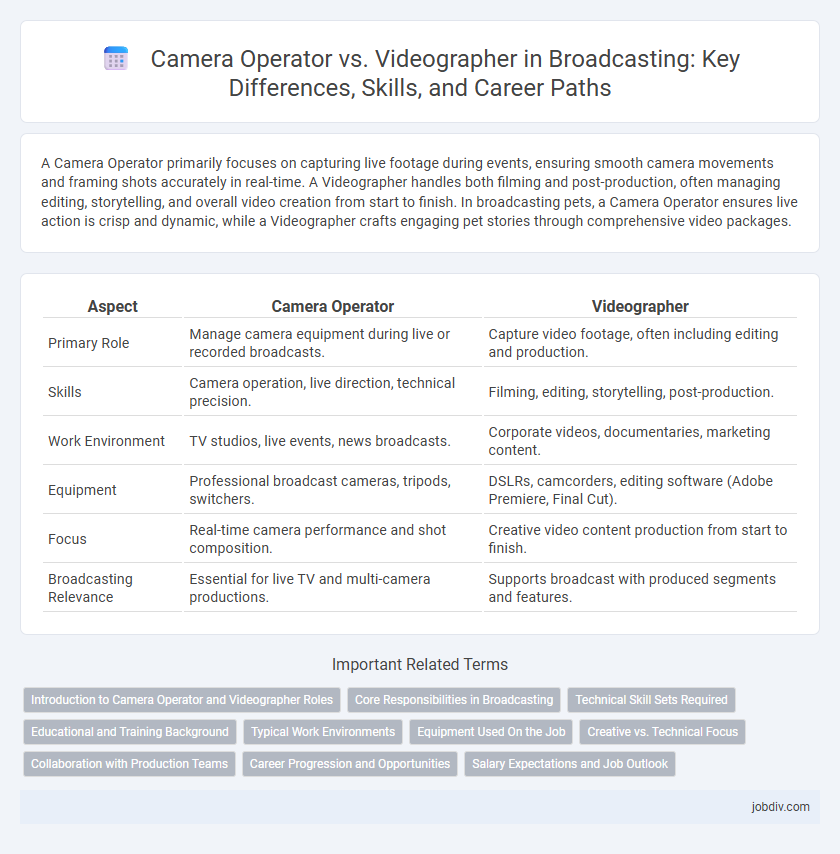A Camera Operator primarily focuses on capturing live footage during events, ensuring smooth camera movements and framing shots accurately in real-time. A Videographer handles both filming and post-production, often managing editing, storytelling, and overall video creation from start to finish. In broadcasting pets, a Camera Operator ensures live action is crisp and dynamic, while a Videographer crafts engaging pet stories through comprehensive video packages.
Table of Comparison
| Aspect | Camera Operator | Videographer |
|---|---|---|
| Primary Role | Manage camera equipment during live or recorded broadcasts. | Capture video footage, often including editing and production. |
| Skills | Camera operation, live direction, technical precision. | Filming, editing, storytelling, post-production. |
| Work Environment | TV studios, live events, news broadcasts. | Corporate videos, documentaries, marketing content. |
| Equipment | Professional broadcast cameras, tripods, switchers. | DSLRs, camcorders, editing software (Adobe Premiere, Final Cut). |
| Focus | Real-time camera performance and shot composition. | Creative video content production from start to finish. |
| Broadcasting Relevance | Essential for live TV and multi-camera productions. | Supports broadcast with produced segments and features. |
Introduction to Camera Operator and Videographer Roles
Camera operators manage broadcast cameras, focusing on live event coverage and precise shot composition to ensure seamless visual storytelling. Videographers handle all aspects of video production from shooting to editing, often working independently on projects like documentaries and corporate videos. Both roles require technical expertise and creativity, but camera operators typically operate within larger production teams, while videographers often work in more versatile capacities.
Core Responsibilities in Broadcasting
Camera operators in broadcasting specialize in capturing live feeds and directing camera movements to follow fast-paced events, ensuring seamless real-time footage for transmission. Videographers manage both filming and editing, crafting cohesive stories by combining visual elements with post-production processes. Both roles require technical expertise with broadcast equipment but differ as camera operators focus on live coverage, while videographers handle comprehensive content creation.
Technical Skill Sets Required
Camera operators require expertise in handling broadcast cameras, understanding live production workflows, and mastering real-time shot composition, while videographers must excel in operating various camera models, lighting techniques, and post-production editing software. Proficiency in framing, focus control, and audio capture is essential for both roles, with camera operators emphasizing multi-camera coordination and videographers focusing on project planning and narrative storytelling. Technical skills such as knowledge of video codecs, resolution settings, and color grading tools differentiate the specialized demands of each position in the broadcasting industry.
Educational and Training Background
Camera operators typically receive formal education through specialized film or broadcasting programs emphasizing technical skills in camera operation and live production workflows. Videographers often have a broader training background, combining video production, editing, and storytelling techniques learned through multimedia courses or hands-on experience. Both roles require knowledge of camera equipment and software, but camera operators focus more on live event dynamics while videographers emphasize post-production.
Typical Work Environments
Camera operators commonly work in controlled studio settings, live broadcast events, and multi-camera productions where precise framing and coordination are essential. Videographers typically operate in diverse environments such as weddings, corporate shoots, and documentary locations, requiring adaptability and solo shooting skills. Both roles demand expertise in camera technology, but the work environment directly influences their techniques and equipment choices.
Equipment Used On the Job
Camera operators typically use professional broadcast cameras with advanced controls for lens focus, exposure, and zoom, designed for live television production and multi-camera setups. Videographers often rely on versatile digital video cameras or DSLRs equipped with external microphones, stabilizers, and lighting kits for varied shooting environments such as documentaries, events, and corporate videos. Both roles require knowledge of tripods, gimbals, and editing software, but the choice of equipment reflects the specific demands of live broadcasting versus recorded video production.
Creative vs. Technical Focus
Camera operators primarily concentrate on the technical aspects of capturing footage, such as framing, lighting adjustments, and camera movements to ensure precise shots during live broadcasts or productions. Videographers blend creative storytelling with technical skills, controlling camera work while also directing scenes to craft a compelling visual narrative in post-production. The technical precision of camera operators contrasts with the videographer's broader role that integrates artistic vision and editing techniques.
Collaboration with Production Teams
Camera operators coordinate closely with directors and lighting technicians to capture precise shots that align with the production's visual style and narrative goals. Videographers often collaborate with smaller production teams, handling both filming and editing duties to streamline the workflow and maintain creative consistency. Effective communication between camera operators or videographers and producers enhances shot planning, timing, and scene composition, ensuring a cohesive final broadcast product.
Career Progression and Opportunities
Camera operators often advance by specializing in live television production, gaining technical expertise in multi-camera setups and broadcast equipment, leading to roles such as technical director or broadcast engineer. Videographers typically progress by developing narrative storytelling skills and post-production proficiency, opening opportunities in film production, corporate media, and freelance projects. Career growth in broadcasting depends on mastering the specific demands of either live production environments or controlled shoot settings, with videographers enjoying broader creative roles while camera operators excel in live event precision.
Salary Expectations and Job Outlook
Camera operators typically earn an average salary ranging from $38,000 to $65,000 annually, while videographers often see earnings between $30,000 and $55,000, reflecting differences in industry demand and specialization. The job outlook for camera operators is expected to grow by about 5% over the next decade, driven by increased live event broadcasting and sports coverage, whereas videographers face a steadier growth rate of around 2%, influenced by digital content creation and marketing sectors. Both roles require technical proficiency and creativity, but camera operators are more likely to work in large-scale productions, which can lead to higher salary potential and job stability.
Camera Operator vs Videographer Infographic

 jobdiv.com
jobdiv.com